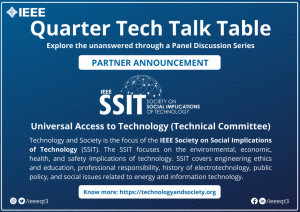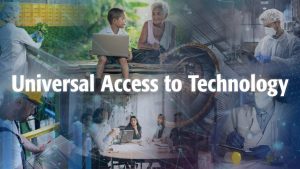SSIT Technical Committee on Universal Access to Technology (UAT)
Our mission includes:
“Universal Access to Technology can be as simple as Electricity access to remote places or as complicated as a complex ehealthcare system with access to medical experts, insurance and infrastructure. So our mission should start with simple goals such as creating awareness to the masses and probably go on to some of the feasible tasks like connecting the supply and demand.”
“Our core purpose is to recognize that universal digital access for all embodies a human-centered and community-centered understanding of a digital society which actively benefits all human-beings. Universal digital access also reminds us of the digital divide, identified long ago in the United Nations millennial goals, which has not been closed. Our purpose is to actively reduce this divide which separates communities and individuals on the basis of ethnicity, religious conviction, sexuality, gender identity, income, age and in many other ways. We are mindful to promote the core values of the IEEE and will place humanitarian concerns at the center of all we do in the context of our striving towards universal digital access. We will demonstrate how to carefully and ethically balance social, cultural and technological dimensions of society to the benefit of all people. In this we also recognize that a digitally enabled civilization has implications for other species and the active valorization non-human life in the scope of our work”
“Universal Access to Technology can be viewed as Digital access that the whole world should be aware of. But that can be possible only when it is being made secure. Only then people can build trust on digital transformation without getting involved in fraudulent activities. Therefore, people should identify principal ethics in developing a new product or software. So in my view, Security and ethics also play a major role in increasing Universal Access to technology to the whole humanity.”
“Universal digital access is a lofty and critical goal, holding a potential to transform the lives of many in the 21st century. It is of tremendous importance to identify groups facing digital gaps, especially those that have been neglected in the past, and find effective ways to help them gain adequate digital access.”
“Universal digital access for all is challenging and critical for a more and more interconnected internet-of-people. Technology for high societal impact built without the strategic and interactive thinking may not provide high quality-of-experience in particular in rural and underserved areas. Control will play important roles in Access To Technology for all: Human-centered collective intelligence for interactive control systems and control for collective intelligence.“
Goals include:
- Contributing to Panels
Having panel sessions including one at ISTAS2021 where we can discuss and elaborate on how we can maximize universal access to the world especially to the underprivileged areas where reachability is tough. Contributing towards panel discussions by introducing latest technologies, their challenges and future directions of researchers. Contributing the findings as a publication, a white paper and Identifying activities to execute for the volunteers if we wish the discussions to continue after the panels.
UAT TC Members contributed to a number of sessions during the American Control Conference (ACC2021) on 26 May 2021:
Special Session on Workshop for Middle and High School Students and Teachers – Dr. Hamidou Tembine, Learning & Game Theory Laboratory, NYU presented “Coopetitive Learning” and Dr. Dominique Duncan, University of Southern California presented “A System and Feedback View of Reopening After Covid-19”.
Special Session on Celebration of 20 years of STEM Workshops on Ideas and Technology of Control and Systems – Luis Kun, Larry Stapleton, Iven Mareels, Huazheng Fang, Ramneek Kalra and Bozenna Pasik-Duncan contributed to the Brainstorming Session “From 20 years ago to 20 years ahead in ideas, technology, security & ethics – Are we prepared?”
 IEEE Quarter Tech Talk Table Series: This event was started with the support of IEEE R10 Newsletter Team to organise panel discussions highlighting important topics of ongoing societal problems and how we can solve them using technology. On 15 May 2021, Ramneek Kalra, Ramalatha Marimuthu and Bozenna Pasik-Duncan participated in the IEEE QT3 Roundtable Discussion on Technology in STEM Education.
IEEE Quarter Tech Talk Table Series: This event was started with the support of IEEE R10 Newsletter Team to organise panel discussions highlighting important topics of ongoing societal problems and how we can solve them using technology. On 15 May 2021, Ramneek Kalra, Ramalatha Marimuthu and Bozenna Pasik-Duncan participated in the IEEE QT3 Roundtable Discussion on Technology in STEM Education.
On 06 May 2022, Bozenna Pasik Duncan participated in the Quarter Tech Talk Table 7.0 focused on a Panel discussion on “AI and ML inchmeal: Advancement for Career Development“.
Our longer term activities include:
- Educate for Technology: Before stepping into giving universal access to technology to all members or society, the very first responsibility is to bring awareness about technology itself by organizing and setting up Rural/Urban Programs such as Internet Sathi (Google + Tata Trusts) Initiative. This is because education plays an important role to make awareness about the difference between pros & cons of technology access and how it should be provided to become fruitful for society.
- Empower for Technology: After having a network hub of education webinars/workshops across globe, it’s a task to connect the dots of different motivations from different IEEE OUs or organizations to share the outcome of UAT itself to society. This will help us to sustain the empowerment of sharing knowledge about technology with outreach to more people. With this, we will also achieve the flexibility of spreading the knowledge about technological advancements across our connected society.
- Encourage for Technology: In the last phase, giving authority to benefitted members from our initiatives, we should encourage them to go ahead & organize more events under our support and guidance to bring vibrancy in the mission & vision of our committee.
These three focus areas summarise the integration of technology introduction & applications which we believe our Committee can bring forward under the banner of IEEE SSIT.
We propose to expand and join continued activities led by our members: Ramneek and Ramalatha
- IEEE YESIST12 – Motivating & Encouraging Social Innovation & Project Based Learning from Pre-University Students to Young Professionals.
- IEEE WIE Project Based Learning School Camp – Motivating Project Based learning Approach through technology to Pre-University Students across Globe under banner of IEEE WIE STAR Program. This works by connecting their curriculum with the motive of sharing access to technological resources in their hands directly.
SSIT TC on Universal Access to Technology (UAT) Members include:
- Bozenna Pasik-Duncan, USA (Chair)
Dr Bozenna Pasik-Duncan is a Professor of Mathematics & Courtesy Professor of AE at University of Kansas. She is Past Global Chair of IEEE WIE & IEEE SSIT Representative in IEEE WIE, IEEE Life Fellow, IFAC Fellow & AWM Fellow and Past Chair of IFAC Task Force on Diversity and Inclusion (D&I).
- Iven Mareels, Australia
Iven Mareels, is an honorary Professor at the University of Melbourne, and Director of the Centre for Applied Research (IBM in Australia/New Zealand). The center has the remit to consider Data & AI on hybrid cloud infrastructure, in three main areas: climate & sustainability, data & AI governance, and engineered compliance. In the context of IBM’s core value to use technology only to make the world a better place, the center’s remit is particularly relevant to the mission of the TC on Universal Access to Technology.
- Larry Stapleton, Ireland
Larry Stapleton is Director of the Centre for Information Systems and Techno culture at WIT in Ireland. He is coordinating committee chair for the Social Effects of Control and Automation systems in IFAC, and holds visiting professor positions in Digital Systems and Social Transformation in several universities across the world. He is passionate about digital transformation both in organizations and society, and the role of digital technology as a way to improve conditions in less developed regions, especially post-conflict zones. He is concerned that technological considerations are not always balanced with cultural and social challenges and opportunities. He is convinced that a systems science approach can contribute exciting, ethical solutions and create a harmony between human-and-machine which valorizes human capability, ingenuity and skill.
- Ramalatha Marimuthu, India
Ramalatha Marimuthu is a professor in Kumaraguru College of Technology and the General Chair of IEEE YESIST12, an international talent show for school students, Engineering students and young technologists on the theme of United Nations Sustainable Development Goals. As a passionate volunteer towards increasing Diversity and Inclusion, she believes in equal opportunity to all -especially in access to technology. She launched an exclusive project called “Sangamam” under the Region 10 Women in Engineering in 2008 with the tagline “Transfer of Technology to the Underserved” under which projects like “Electricity to Tribal Village”, “Computer Literacy for Rural School Girls” and “Technology based Women Entrepreneurship” were executed.
- Huazheng Fang, USA
Huazhen Fang is an associate professor of mechanical engineering at the University of Kansas. He works in the area of control systems, energy management and robotics. He values research in the interest of broad society and has been motivated to address research challenges arising from societal or industrial imperatives. He holds the belief that diversity, equality and inclusion are key for every individual to live up to their potential and for our society to grow better and more sustainably. In this belief, he has committed myself to promoting equal access to opportunities among students at all levels through community outreach services, teaching and research.
- Dominique Duncan, USA
Dominique Duncan is an assistant professor of Neurology at the USC Stevens Neuroimaging and Informatics Institute in the Laboratory of Neuro Imaging (LONI). Dr. Duncan’s background spans mathematics, engineering, and neuroscience. She is funded through both the NIH and NSF, and she has built international, multidisciplinary collaborations and developed novel analytic tools to analyze multimodal data, including imaging and electrophysiology, particularly in the areas of traumatic brain injury and epilepsy. By creating large-scale data repositories and linking them with analytic tools, for both neuroimaging and electrophysiology data as well as multimodal data of COVID-19 patients, she aims to encourage collaboration across multiple fields.
- Tembine Hamidou, France & Senegal
Tembine Hamidou is a Director of Learning & Game Theory Lab. L&G Lab offers courses on strategic learning and mean-field-type game theory for social impact. Application to 5G, Internet-of-people and blockchains are considered within L&G Lab. These are also relevant to the IEEE SSIT UAT committee mission on Universal Access To Technology
- Shally Gupta, India
Shally Gupta, is a Research Scholar who is working upon the latest technologies like Fog Computing and Deep learning methodologies. Gained certifications for learning tools such as Docker and Kubernetes. Have expertise in Cloud Computing and Internet of Things (IoT). In context to the knowledge gained while being an academician I think I can contribute to the committee by sharing my thoughts, experiences to the world via organizing tech events etc. and make people aware about latest technology trends which is the foundation of this committee i.e. Universal Access to technology
- Ramneek Kalra, India
Ramneek Kalra is a working professional at Amazon Web Services Inc. and a volunteer in IEEE since 2016. He is serving as a Program Lead at IEEE CS SLP (CS SYP), Professional Development Coordinator at IEEE Delhi YP AG, Member of Volunteer Engagement Working group at IEEE PECC and contributing as an IEEE Impact Creator. He has been contributing to UAT Objectives as organizer of IEEE QT3 Series and IEEE WIE PBL School Camp, Co-Chair at WePOWER Track and pre-university teaching at Atal Innovation Mission (NITI Aayog, Govt. of India Initiative).







 JOIN SSIT
JOIN SSIT